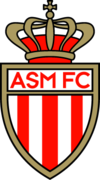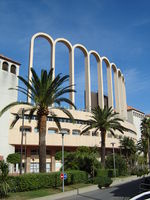AS Monaco FC
 |
||||
| Full name | Association Sportive de Monaco Football Club |
|||
|---|---|---|---|---|
| Nickname(s) | Les Rouge et Blanc (The Red and Whites) |
|||
| Founded | August 23, 1924 | |||
| Ground | Stade Louis II (Capacity: 18,500) |
|||
| Chairman | ||||
| Manager | ||||
| League | Ligue 1 | |||
| 2009–10 | Ligue 1, 8th | |||
|
||||
Association Sportive de Monaco Football Club (French pronunciation: [a.sɔ.sja.sjɔ̃ spɔrtɪv də mɔnaˈkɔ]; commonly referred to as AS Monaco or simply Monaco) is a Monégasque football club based in the Principality of Monaco. The club plays in Ligue 1, the top division in French football, and are one of the most successful clubs in the country having won seven league titles and five Coupe de France trophies. Monaco have also regularly competed in European football, being runners-up in both the UEFA Cup Winner's Cup and UEFA Champions League in 1992 and 2004, respectively.
AS Monaco is the only club within the French football league system not based in France itself, being based in the sovereign principality of Monaco. The club enjoyed numerous successes in the 1970s and late 1980s during the managerial tenures of Lucien Leduc and Arsène Wenger, during which they were amongst the leading lights of European football. Monaco's traditional colours are red and white, and they are affectionately known as Les Rouge et Blanc (English: The Red and White). The club currently plays their home matches at the Stade Louis II in Fontvieille, their home since 1985, and are members of the European Club Association.
Contents |
History
AS Monaco FC was founded on 23 August 1924 as an unification of numerous local clubs based in France and the principality. The club's early years were spent in the amateur regional divisions of the Provence-Alpes-Côte d'Azur region, rising rapidly between the leagues in the 1990s. In 1933, Monaco were invited by the French Football Federation to turn professional. The Monégasques' first year of second division football ended in failure however, as they were relegated to the amateur leagues the following year. By 1948, Monaco re-acquired its professional status and returned to the French second division; they subsequently consistently finished in its upper echelons, with this sustained effort resulting in promotion to the French first division for the first time in 1953.
In 1960, Monaco's first iconic coach, Lucien Leduc, led the club to its first professional trophy, the Coupe de France, beating Saint-Étienne 4–2 in extra time. This initial success was bettered in the following year with the club winning the French Championship for the first time in its history, qualifying for the European Cup. Leduc subsequently led the club to its first League and Cup Double in 1963. Upon Leduc's departure in 1963, Monaco endured a barren run, entrenched in the middle half of the league for the best part of the next decade and alternating between the first and second divisions after 1963. In 1975, Jean-Louis Campora, son of former president Charles Campora, became chairman of the club. In his second season, he brought back Leduc, who immediately won the club promotion to the first division and won them the championship the following year in 1978. Leduc subsequently left the club again in 1979, to be succeeded by Lucien Müller and Gérard Banide, both of whom were unable to halt the club's decline.
The early 1980s saw a steady stream of successes in national competitions. Monaco won a title almost every other year; the Coupe de France in 1980 and 1985, the French Championship in 1982, was Coupe de France finalist in 1984. In the 1985–86 season, Monaco hammered Bordeaux 9–0, one of the biggest wins in club history. [1]
Disappointingly for Monaco fans, the club could not translate its domestic leadership into European success. Up to this point, Monaco had never past the first round of any European competition. Monaco lost to Dundee United (1981) CSKA Sofia twice (1982 and 1984) and Universitatea Craiova.[2]
In 1986, famed Ajax manager István Kovács, who succeeded Rinus Michels and honed his total football ideals with the Dutch champions, came out of a three-year "retirement" to manage Monaco, but even he could not bring them success. With the club facing a second barren spell, they signed legendary future Arsenal manager Arsène Wenger, who had hitherto been relatively unknown, managing Nancy without much success. Wenger's reign saw the club enjoy one of its most successful periods, with several inspired signings, including future legends George Weah, Glenn Hoddle, Jürgen Klinsmann, and Youri Djorkaeff, and youth team policies which produced future World Cup winners Emmanuel Petit, Lilian Thuram, and Thierry Henry. Under Wenger, they won the league in his first season in charge (1988) and the Coupe de France in 1989 and 1991, with the club consistently competing in the latter stages of the European Cup and regularly challenging for the league title.[3] The club could have had even greater success in this period, as it emerged in 1993 that bitter rivals Marseille had indulged in match fixing and numerous improprieties, a view that Wenger had long held.[3] In 1995, after being blocked by the Monaco board from opening discussions with German powerhouse Bayern Munich for their vacant managerial post after being shortlisted for the role, Wenger was released from the club, several weeks after the post had already been filled.[3][4]
After Wenger's departure, the club endured a relatively poor run, only winning the league twice afterwards (1997 and 2000), amidst rumours that the club was facing numerous financial difficulties. Wenger's successor, Campora, left the club in 2003, with Monaco facing relegation into the second division due to a huge deficit and a dearth of investors. His replacement, Pierre Svara, took charge on a temporary basis in 2003, with the club enjoying a remarkable run towards the final of the UEFA Champions League, led by former French national team captain Didier Deschamps and with the team featuring stalwarts such as Fernando Morientes, Ludovic Giuly, Jérôme Rothen, and Dado Pršo, beating Real Madrid and Chelsea along the way. Even with this successful run, Svara was soon replaced by Michel Pastor. One of Pastor's first tasks was to hold onto the players who had turned the club into one of the best in Europe, but he failed to convince them to stay, and their replacements were unable to replicate previous successes. After four years, six coaches and only mid-table finishes, Pastor left the club amid severe criticism of his management skills.
In 2008, Jérôme de Bontin, a leading shareholder of the club since 2003, took charge of the club, promising a complete shake-up at the club. Under his reign, the club brought in players such as Park Chu-Young and Freddy Adu, but they did not find much success on the pitch, going through a torrid season and only managing a mid-table finish. De Bontin resigned at the end of the season, replaced by banker Etienne Franzi and a new board of directors.[5] In July 2009, Brazilian manager Ricardo Gomes was replaced by former Cannes and Rennes coach Guy Lacombe, inheriting a youthful squad featuring numerous highly lauded youth team prospects, including Cédric Mongongu, Serge Gakpé, Vincent Muratori, Frédéric Nimani, Nicolas N'Koulou, Yohan Mollo, and Yohann Thuram-Ulien.[6]
Stadiums

Monaco have played at the original Stade Louis II stadium since its beginnings in 1939; in 1985, the stadium was replaced with the current iteration, built on a nearby site consisting of land reclaimed from the Mediterranean Sea, a recurring feature of its seaside Fontvieille surrounds. Housing a total of 18,500 supporters and noted for its iconic nine arches, it has hosted numerous athletic events and European cup finals, including each instance of the annual UEFA Super Cup. The ground's pitch has been changed numerous times of late, and at the beginning of the 2008–09 season underwent numerous renovations, including the installation of two large screens. The club train in nearby La Turbie at a newly-built training facility featuring state-of-the-art gyms, pools and conference centres.
Players
First-team squad
As of 7 July 2010.[7] Note: Flags indicate national team as has been defined under FIFA eligibility rules. Players may hold more than one non-FIFA nationality.
|
|
Out on loan
Note: Flags indicate national team as has been defined under FIFA eligibility rules. Players may hold more than one non-FIFA nationality.
|
Notable players
For a complete AS Monaco FC players list, see here.
|
|
Managers
|
|
Honours
Domestic
- Ligue 1
- Winners (7): 1961, 1963, 1978, 1982, 1988, 1997, 2000
- Coupe de France
- Winners (5): 1960, 1963, 1980, 1985, 1991
- Coupe de la Ligue
- Winners (1): 2003
- Trophée des champions
- Winners (4): 1961, 1985, 1997, 2000
- Coupe Gambardella
- Winners (2): 1962, 1972
European
- UEFA Champions League
- Runners-up (1): 2004
- UEFA Cup Winners' Cup
- Runners-up (1): 1992
- Coppa delle Alpi
- Winners (3): 1979, 1983, 1984
Records
| Name | Games |
|---|---|
| 755 games | |
| 602 | |
| 428 | |
| 349 | |
| 334 | |
| 326 | |
| 319 | |
| 315 | |
| 304 | |
| 303 |
| Name | Goals |
|---|---|
| 223 goals | |
| 115 | |
| 89 | |
| 77 | |
| 76 | |
| 74 | |
| 68 | |
| 67 | |
| 67 | |
| 66 |
References
- ↑ http://www.frenchleague.com/club/historique.asp?no_affil_fff=500211
- ↑ http://bundesliga.weltfussball.at/teams/as-monaco/1986/3/
- ↑ 3.0 3.1 3.2 Jasper Rees (18 August 2003). "Inside the mind of Arsène Wenger (excerpt from Wenger: The Making of a Legend by Jasper Rees)". The Guardian. http://www.guardian.co.uk/football/2003/aug/18/sport.comment.
- ↑ Arsene Wenger The Biography by Xavier Rivoire
- ↑ "Monaco: Etienne Franzi président". Sport.fr. 2009-03-21. http://www.sport.fr/Football/foo/Ligue-1-Monaco-Etienne-Franzi-president-152330.shtm. Retrieved 2009-09-09.
- ↑ "The little princes of Monaco". FIFA.com. http://www.fifa.com/worldfootball/clubfootball/news/newsid=677973.html.
- ↑ Equipe Pro
External links
- (French) Official club website
|
||||||||